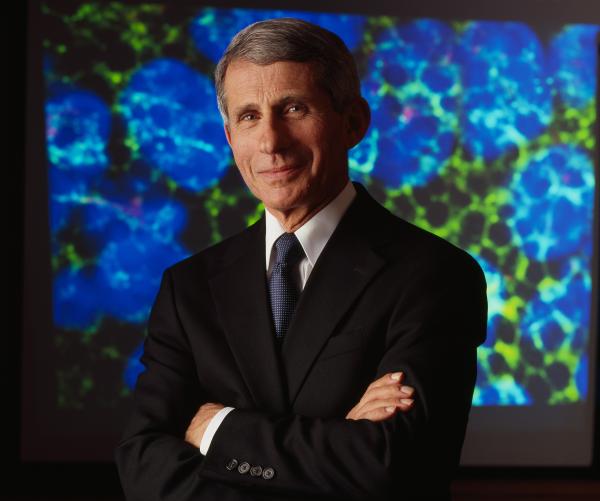The SIG Beat: COVID-19 Fauci
News From and About the Scientific Interest Groups
COVID-19 SIG: Anthony Fauci Outlines Lessons Learned
As the novel coronavirus SARS-CoV-2 has swept through the world over the past two and a half years, it has infected more than half a billion people with COVID-19 and has caused nearly six and a half million deaths globally. The National Institute of Allergy and Infectious Diseases (NIAID) helped develop safe and effective mRNA COVID-19 vaccines and therapeutics. On September 15, 2022, the COVID-19 Scientific Interest Group hosted a virtual lecture by NIAID Director Anthony Fauci, who has served as advisor to seven U.S. presidents and has dealt with major public health challenges including HIV-AIDS, Ebola, and COVID-19.
In his “Pandemic Preparedness and Response: Lessons from COVID-19” talk, Fauci shared some lessons learned.

NIAID
Anthony Fauci
Global information sharing and collaborations are essential. The sharing of reagents, surveillance data, convalescent and patient samples, real-world clinical data, and genomic data has been extremely important in our ability to address the many problems that have arisen over the past 2 1/2 years.
Leveraging existing clinical-trials networks is important. Four NIAID-funded HIV clinical trials were merged to form the COVID-19 Prevention Network, which ran accelerated clinical trials of COVID-19 vaccines and drugs and saved millions of lives.
Prior scientific advances enabled rapid development of COVID vaccines. The speed and efficiency with which the highly efficacious COVID vaccines were developed was due to the extraordinary multidisciplinary effort that involved basic preclinical and clinical science that had been underway out of the spotlight, under the radar screen, even before the COVID-19 pandemic.
Priority- and prototype-pathogen approaches help us prepare for pandemics. A priority-pathogen approach means preemptively making a vaccine for a pathogen, such as Zika and Ebola. A prototype-pathogen approach involves learning from prior experiences with different pathogen families and applying that knowledge of one virus within a family to inform vaccine design for related viruses. Doing this for each of those families will put us in good stead for the next pandemic that we will inevitably face.
We must continue the surveillance of the human and animal interface. About 75% of all new human pathogens—including HIV, influenza, Ebola, and COVID-19—have emerged from animal-reservoir sources. Although we keep an open mind that the origin of COVID-19 may have been from a laboratory accident, the overwhelming evidence now is showing that it was a natural occurrence that was centered in the Wuhan market in China. Evidence indicates that animals brought in from the wild were very likely infected with SARS-CoV-2 that spilled over to humans in the market.
Long-standing systemic health and social inequities drive pandemic disparities. African Americans, Latinos, Native Americans, Alaska Natives, and Pacific Islanders were disproportionately affected by COVID-19. The inequities include discrimination; limited access to and use of health care resources; educational, income, and wealth gaps; and crowded housing conditions that make it difficult to follow prevention strategies such as social distancing.
Misinformation is still the enemy of public health. Misinformation campaigns, conspiracy theories, and fraudulent claims about unproven therapies hindered the dissemination of vaccines. Such misinformation needs to be addressed.
Looking ahead
Fauci predicted that it may not be possible to eradicate or eliminate SARS-CoV-2, but believes that it could be controlled at a level that doesn’t disrupt our social order or interfere with the economy. “To get there, we believe we have to have the availability of intermittent vaccination,” he said. We also need “other things such as respiratory hygiene, attention to ventilation indoors, masking where appropriate, and the availability of effective [antiviral drugs] and monoclonal antibodies.”
He hopes that one day we may have a pan-coronavirus vaccine to protect against multiple types of coronaviruses, especially pandemic-causing ones. NIAID is conducting and funding studies on developing universal vaccines and therapeutics, as well as on other pathogens of pandemic concern.
“Emerging infectious diseases have always been with us before we even recorded them,” Fauci said in his concluding remarks. “The only way to address them as a global community is to be perpetually prepared. Let’s hope that our corporate memory of these lessons does not fade as we put COVID-19 behind us in the future years.”
To watch the videocast of Fauci’s talk, go to https://videocast.nih.gov/watch=45929. To find out more about the COVID-19 Scientific Interest Group, go to https://www.niaid.nih.gov/research/covid-19-sig.

Sunita Chopra is a visiting postdoctoral fellow in the National Cancer Institute’s Radiation Oncology Branch, where she studies radiation-responsive coding and noncoding RNA signatures in the blood of whole-body-irradiated animal models. She plans to transition into a writing-intensive career after finishing her training at NIH. Outside of work, she enjoys being outdoors, cooking, listening to Bollywood songs, and being with friends.
This page was last updated on Wednesday, November 9, 2022
